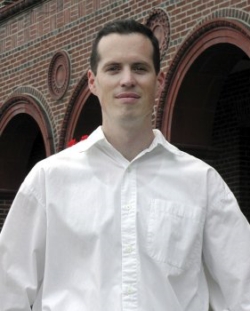Church in the 21st Century Center looks to the future
BRIGHTON—The Church in the 21st Century Center at Boston College provides a forum where various Catholics can communicate the necessity of the Church in the world and in individual faith, according to director of the center Timothy Muldoon.
“I want people to be committed to the idea that the Church is worth our energy and time,” he said. “I want this center to foster events that help people to recognize that.”
The center seeks to attract Catholics of all ages but has a focus of handing on the faith to young people, an important part of any Catholic university, he said.
“For many young people there is a disconnect between the ordinary lives that they lead and their Church lives,” Muldoon added. “The world they live in tells them in many ways, ‘You’re free to figure this out for yourself. You’re free to develop as a human being in any way you see fit.’”
This, however, is a mixed message, he said.
“Yes you can develop as a person of faith on your own but why do it by yourself, and what convinces you that that’s a good thing?” he added.
The center would like to show young adults that they do not have to take the journey of faith by themselves. They need to be a part of the Church in order to grow the way God wants them to grow, he said.
The Church in the 21st Century began in 2002 as a response to the problems the Church was facing after the abuse scandal. It was originally intended as only a two-year program
“It was very much in the mode of trying to be a positive place of conversation about the very serious things that were going on in the Church during that difficult period,” Muldoon said. “There was a crisis. We wanted to be a positive force in addressing it.”
The program focused on dialogue regarding the roles and relationships between Church members, handing on the faith to young people, and sexuality in light of Catholic tradition.
The program proved so popular that BC decided to make it permanent, and Muldoon was brought on as the director in July of last year.
Before coming to BC, Muldoon served as an associate professor and chair of the Department of Religious Studies, Philosophy, and Theology at Mount Aloysius College in Cresson, Penn. for six years.
A graduate of BC, he said he was interested in the program in part because he had done work in all three of the focus areas. He wrote his doctoral dissertation in theology at Duquesne University about sexuality, has done scholarly work on young adult Catholic spirituality and has played many different roles as a Catholic layperson.
While content of the program has not changed much since being made permanent, the center has made a point of planning farther ahead and asking questions about its own place in the Church, he said.
“We want to think long-term,” he said. “What does it mean to be Church today? How can a Catholic university be a resource and a support for what it means to be Church today?”
Because of this, a fourth goal of dialoguing about the Catholic intellectual tradition has also been added to the program’s mission.
Last fall the center featured several events including a panel presentation on “The Church in the 21st Century: Why women choose to stay,” a day-long study on the Voice of the Faithful movement and a conference for students called “Our Church, Our Faith, Our Future.”
Cardinal Avery Dulles, spoke on “The Faith that the Church Hands on” to standing-room-only crowd at an Oct. 12. The lecture dealt with the challenges faced by religious institutions working to pass on the Catholic faith in today’s changing world. The talk was “thought-provoking” and attended by a wide range of Catholics, including students from a local Catholic high school, Muldoon said.
“You really are spanning the generations when you can get an octogenarian cardinal talking to teenage high school students about the substance of Catholic faith. That’s something we want to see more of,” he said.
Yet one of the challenges that the center faces is how to serve its diverse audience, he said.
“How do you address students on campus today and at the same time speak to people who have been in the Church for 60 years?” he said. “In many ways they are the same challenges that the Church at large faces — how to minister to kids, young adults, older adults and senior citizens.”
The center also has a responsibility to accurately portray the Catholic Church to its audience because it represents the Church, he added.
“The very fact that we have the word ‘Church’ in our name means that in some way we are going to be — just by default, not because we desire to be — portraying the Church to some of our audience,” he said. “I take that responsibility very seriously.”
In the future Muldoon said the center is planning several events including a conference on the philosophical legacy of Pope John Paul II. The center also hopes to expand programs for students and invite different bishops to speak on campus.
<



















